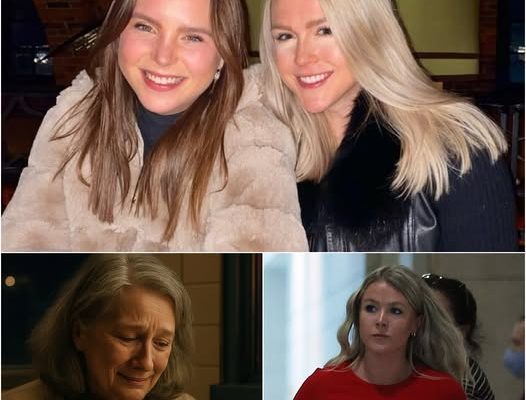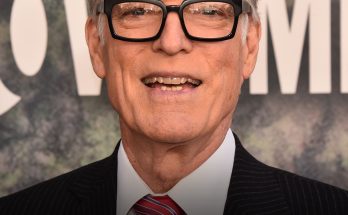Karoline Leavitt discovers her former high school mentor driving Uber—what happens next changes both of their lives forever
It was one of those nights in Washington, D.C. where the cold felt personal—like it wasn’t just brushing your skin, but pressing into your bones. After hours of speeches, photo ops, and media appearances for a youth empowerment summit, Karoline Leavitt, the White House Press Secretary, slipped out the side exit of the Marriott ballroom, exhausted and craving silence.
She declined her driver for the night.
“I just need a quiet ride,” she said, tightening her coat.
“No briefings. No staff. Just… space.”
She opened her rideshare app. A black Toyota Camry. Five minutes away.
As she stood outside the hotel, scrolling half-heartedly through unanswered texts and flagged emails, she had no idea that the next 20 minutes would shift something in her life—deeply, permanently.
The driver with the familiar voice
The Camry pulled up.
Karoline slid into the back seat, barely glancing up.
“Good evening,” she said softly.
“Capital View Residences, please.”
“Yes, ma’am. Should be about twenty minutes,” the driver responded.
And then—that voice.
Steady. Warm. Precise.

Like chalk on a blackboard. Like morning announcements in a quiet New Hampshire high school.
Her eyes lifted to the rearview mirror.
And there they were—those same kind eyes.
“Ms. Kimble?” Karoline whispered.
The driver stiffened slightly. Then turned back, her face registering slow surprise.
“Karoline Leavitt.
The girl who debated circles around her entire senior class.
It’s been a while.”
From classroom to car seat
Ms. Evelyn Kimble. Karoline’s high school civics teacher—the first person who told her she had a voice that people would listen to if she learned to sharpen it.
“You told me to apply for Georgetown,” Karoline said softly.
“You wrote my first-ever speech.”
Ms. Kimble chuckled, eyes on the road.
“And you told me you’d bring common sense back to Washington.
Looks like we both kept our promises.”
Karoline smiled. Then paused.
“But what… what are you doing driving Uber at this hour?”
A silent struggle brought to light
Ms. Kimble didn’t flinch.
“Retirement didn’t stretch. My sister fell ill—ALS. I cashed out my pension to pay for her care. Then I lost the house.”
She spoke without self-pity. Just facts.
“Now I live in a studio apartment, teach civics online part-time, and drive Uber to cover meds, groceries, and heat.”
Karoline’s chest tightened.
“Why didn’t you reach out?”
“Reach out to who? I raised warriors. Not beggars.”
The passenger who became the lesson
As the ride continued, Karoline sat in silence, absorbing the quiet tragedy of a woman who once gave everything to shape the future—and now felt discarded by it.
The only sound was the soft flipping of notebook pages in the front seat. Ms. Kimble had pulled over for a red light and was rereading one of her old lesson plans.
“Still planning lectures?” Karoline asked.
“Always. I still tutor kids who’ve never heard the words ‘First Amendment’ in class. Imagine that. In 2025.”
The twist no one expected
As they neared Karoline’s neighborhood, the car turned onto a private street—and suddenly stopped.
Flashing lights.
Three black SUVs.
A Secret Service officer stepped forward, tapping on the glass.
“Ms. Leavitt, we need to reroute. We’ve received a credible threat involving your location.”
Ms. Kimble’s eyes went wide.
“Wait—you’re that Karoline Leavitt? The Press Secretary?”
Karoline sighed, looking at her with apology.
“I wanted to tell you earlier. But… I didn’t want to make tonight about who I am. I wanted it to be about who you are.”
A quiet reunion, and something more
Instead of heading straight home that night, Karoline asked Ms. Kimble if she’d be willing to join her for a short drive.
“Just a little detour,” she said with a smile.
“I know a diner nearby that still serves decent coffee at midnight.”
They sat at a corner booth, two steaming mugs between them, the clink of silverware and low hum of jukebox music filling the silence. They talked—not about politics, not about success—but about life.
About students they remembered, about mistakes made, about what it meant to grow older while still trying to matter.
Before they parted, Karoline reached into her purse and handed Ms. Kimble a small, wrapped package.
“Open it when you’re home,” she said.
The gift that said everything
That night, alone in her studio apartment, Ms. Kimble carefully unwrapped the gift.
Inside was a framed photo—a snapshot from Karoline’s high school graduation. There, in the corner, stood Ms. Kimble, smiling proudly behind the crowd.
And taped to the back of the frame, a note written in Karoline’s handwriting:
“I found this in an old album. I didn’t know until years later that you were watching me that day.
But I’ve been watching you ever since.
You were never just a teacher.
You were the reason I kept going.
This world still needs your fire.
Love, Karoline.”
Ms. Kimble pressed the frame to her chest, eyes brimming.
Every few weeks, they met again—at the same booth, same corner table. Sometimes Ms. Kimble brought baked goods, sometimes Karoline brought stories from the road.
No interviews. No cameras.
Just two women, a teacher and her student, reminding each other of who they were—and who they still could be.
Sometimes, the most powerful legacies aren’t written in headlines.
They’re found in quiet car rides, in old notebooks, in hot coffee and warm memories.
**Because the people who shape us never truly fade—
They simply wait to be remembered**
And on one cold night, in the back of a rideshare car,
Karoline Leavitt finally remembered the woman who helped her become herself.



